
I have been tossing and turning over La Cieca’s most recent assignment for me: a CD
of Wagner’s Der Fliegende Holländer based on a performance live in concert from November 13, 2010. The anxiety mainly stems from the fact that, horror to say, I am no Wagnerite. I know that sect of opera buffs has religious devotion to Herr Wagner, and secret codes of conduct and rituals that I unwittingly will transgress.
On a personal note, Wagner’s Ring Cycle was actually my introduction to opera (specifically the Levine DVDs with James Morris). I’m sure we all can track that one instant when opera took hold as a lifelong obsession… the first scene of Das Rheingold was my epiphany moment. Immediately upon finishing the DVD, I went to Barnes & Noble (remember when stores carried opera DVDs?) and bought Die Walküre. The rest of the cycle followed suit. My early years of operatic passion were spent with Der Ring and Parsifal, and I’ve recently learned to deeply appreciate Lohengrin. But know that, coming to this review, the only bits of Dutchman that I was familiar with were the Overture and “Die frist ist um”.
My own personal apologies aside, this disc has many things going for it. Firstly, the recording quality is absolutely stellar. How the production team managed to get this clean of a take from a one-night-only live concert astounds me. The orchestra, Radio Symphony Orchestra Berlin, sounds vibrant, crisp, and clean. Their tuning, barring some errant flutes and piccolos, is spot on, and they manage to switch emotions on a dime and display all of the colors that Wagner’s score demands.
They are led by Marek Janowski, who’s bio states that he is known for ”fresh and unusual insights into works which tend to be underestimated, or apparently overfamiliar.” Not knowing other performances of the piece, it’s hard for me to judge his claims, but you can sense the depth of passion that he brings to this opera, as the music surges onward, propelling the drama. Bravo to you, maestro!
The work itself is very curious. As one more familiar with the later Wagner operas, the piece seems almost basic. The score seems to owe a serious harmonic and structural debt to Carl Maria von Weber, and Beethoven’s Fidelio. It’s rife with romantic, spooky music, very reminiscent of the whole Wolf’s Glen scene from Freischütz, or various scene-chewing moments in Marschner’s Der Vampyr.
Wagner seems still bound by the traditions of his predecessors: he gives duets to his characters, and the leitmotivic themes are collected almost to a one in the overture. Rather than weave several leitmotifs together, as he does in the Ring, Wagner’s themes pop up throughout the piece in obvious recapitulations. It all seems a bit blunt. That being said, the music does have incredible forward drive, especially here in this one-act version of the opera (makes for difficult pee breaks).
The singing on the disc is a bit of a letdown. It’s not awful by any means, just a bit hacky. The easy standout is Albert Dohmen’s Dutchman. His thick, dark, wicked voice has just the correct amount of violence for this punishing role. “Die frist ist um,” the male equivalent of Turandot’s aria, is a voice-shredder that Dohmen quite simply dominates. He has a shouty quality that would be considered a fault in Italian or French repertoire, but here it shines. If there is anything to complain about, his top is a bit hooky, and he fails at the moments where the Dutchman needs to be tender, just because of the absolute evil inherent in his instrument. He lacks the finesse of George London, but I would love to hear him sing live, as I’m sure the voice is gigantic. His Wotan would be fantastic.
Robert Dean Smith’s Erik is definitely passable. There is no question that his is a real Heldentenor voice. It’s large, round, and has the stamina to get through the Wagner’s punishing vocal lines, but his technique seems inconsistent. He may have been sick in this recording, as he will sing a phrase that will make you think, “That’s it!” and a few bars later, totally botch something. The voice’s color is overly compressed for my taste; it’s more of a work-horse instrument. I’ve definitely heard him in other recordings and have been wowed, but not here.
The Senta of Ricarda Merbeth falls into the same category: good… just not great. In particular, hers is not a voice that is smooth or lined up from top to bottom. The bottom can be very hollow, and the top can be pressed and pitchy, but the middle is very sizeable and impressive. She definitely has the vocal goods, but lacks the technique to carry the role off with ease.
I was excited when I saw Matti Salminen’s name on the disc. His performance as Hunding in the Levine DVDs was riveting to me several years ago (in that formative experience). Here, however, he definitely shows signs of age. I don’t think it’s his fault, as the role of Daland seems much more buffo and light than Salminen’s large bass voice. A lot of the required color just wasn’t there. Steve Davislim (Steersman) had difficulty with the top, but his voice has a very nice Wunderlich-y Tamino color. I’m sure with a bit more age and experience, he will be quite an in-demand tenor.
All-in-all, I can’t heartily recommend the CD. If you are listening purely for orchestral color or style, I’m sure the disc will interest you. Otherwise, you are probably better off searching through the thousands of other recordings to find one with a more accomplished cast.














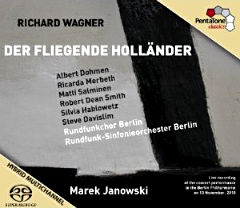
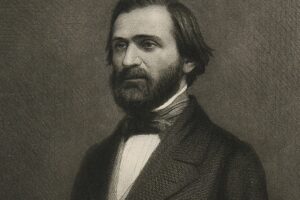
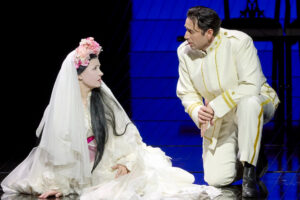
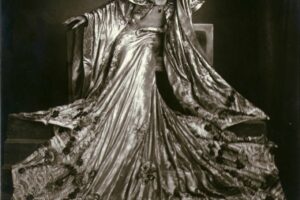
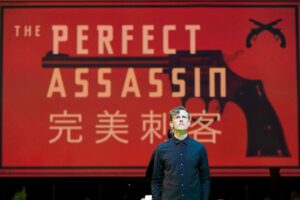






Comments